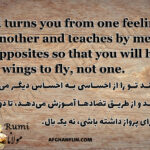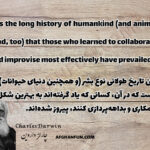Fly with Two Wings: A Lesson from Rumi
God turns you from one feeling to another and teaches by means of opposites so that you will have two wings to fly, not one
Rumi
Unlock Your Potential: Rumi Lesson in Contrasts
خداوند تو را از احساسی به احساس دیگر میگرداند و از طریق تضادها آموزش میدهد، تا دو بال برای پرواز داشته باشی، نه یک بال.
مولانا
مولانا در این جمله به یکی از اصول مهم رشد و تکامل روحی اشاره میکند. او میگوید که خداوند انسان را از احساسی به احساس دیگر میبرد، یعنی در زندگی، ما پیوسته دستخوش تغییرات عاطفی و تجربیات متضاد میشویم؛ گاهی شادی، گاهی غم، گاهی امید، گاهی ناامیدی. این تضادها نهتنها بخشی از طبیعت زندگی هستند، بلکه وسیلهای برای آموزش و تکاملاند.
چرا؟ چون اگر تنها یک بُعد را تجربه کنیم، رشد نخواهیم کرد. همانطور که پرنده برای پرواز به دو بال نیاز دارد، انسان هم برای رسیدن به کمال باید هر دو سوی تجربه را لمس کند. بدون سختی، شیرینی پیروزی را درک نخواهیم کرد؛ بدون شکست، ارزش موفقیت را نخواهیم فهمید. این تغییرات ما را متعادل و پخته میکنند، تا در نهایت بتوانیم مانند پرندهای که دو بال دارد، به سوی حقیقت و کمال پرواز کنیم.
Discover the Power of Two Wings: A Rumi Revelation
Худо туро аз як эҳсос ба эҳсоси дигар мегардонад ва тавассути муқобилҳо таълим медиҳад, то ки ду бол барои парвоз дошта бошӣ, на як.
МАВЛОНО ҶАЛОЛУДДИН МУҲАММАДИ БАЛХӢ
Мавлоно дар ин сухан яке аз қонунҳои муҳими рушди рӯҳониро баён мекунад. Худо инсонро аз як эҳсос ба эҳсоси дигар мебарад, яъне дар зиндагӣ мо ҳамеша тағйироти эҳсосӣ ва таҷрибаҳои мухолифро аз сар мегузаронем. Гоҳе шодӣ, гоҳе ғам, гоҳе умед ва гоҳе ноумедӣ. Ин мухолифатҳо на танҳо як ҷузъи табии зиндагӣ мебошанд, балки худ як мактабанд, ки моро меомӯзонанд.
Чаро? Зеро агар инсон танҳо як ҳолати муайянро таҷриба кунад, рушд нахоҳад кард. Ҳамон тавре ки парранда барои парвоз ду бол лозим дорад, инсон низ барои расидан ба камол бояд ҳар ду тарафи таҷрибаро эҳсос кунад. Бе сахтӣ, ширинии муваффақиятро дарк нахоҳем кард; бе шикаст, арзиши ғалабаро нахоҳем фаҳмид. Ин тағйирот моро мутавозин ва пухта месозанд, то дар ниҳоят битавонем мисли парандае, ки ду бол дорад, ба сӯи ҳақиқат ва камол парвоз кунем.
Fly with Rumi
يُحوِّلك اللهُ من شعورٍ إلى آخر، ويُعلِّمك من خلال التناقضات، لكي يكون لك جناحان تطير بهما، لا جناح واحد.
مولانا جلال الدین الرومي
يشير مولانا في هذا الاقتباس إلى قانون أساسي في نمو الروح وتطورها. فالله يُغيّر مشاعر الإنسان من واحدة إلى أخرى، مما يعني أننا نمرّ بتجارب متضادة في حياتنا؛ أحيانًا نشعر بالسعادة، وأحيانًا بالحزن، أحيانًا بالأمل، وأحيانًا باليأس. هذه التناقضات ليست مجرد صدف عشوائية، بل هي أدوات تعليمية تساعدنا على النمو.
لماذا؟ لأن الإنسان إذا بقي في حالة واحدة فقط، فلن يتطور. وكما أن الطائر لا يستطيع الطيران بجناح واحد، فإن الإنسان يحتاج إلى اختبار جانبي الحياة لكي يكتمل. فبدون المعاناة، لن نُدرك قيمة الفرح، وبدون الفشل، لن نفهم معنى النجاح. هذه التغيرات تصقل شخصيتنا وتجعلنا متوازنين، حتى نتمكن في النهاية من التحليق نحو الحقيقة والكمال كما يفعل الطائر بجناحيه.
A beautiful and thought-provoking quote by the renowned poet Rumi.
This quote from Rumi, the 13th-century Persian poet and Sufi mystic, is a profound reflection on the nature of human experience, spiritual growth, and the interplay of duality. Let’s break it down layer by layer to uncover its depth.
The Surface Meaning
At its core, the quote suggests that life—guided by a divine force, here referred to as “God”—is a dynamic process of emotional and experiential shifts. You’re not meant to stay fixed in one state, whether it’s joy, sorrow, love, or pain. Instead, these shifts serve a purpose: they teach you something essential. The “opposites” Rumi mentions—like happiness and sadness, success and failure—are not random or punitive. They’re tools for growth, giving you “two wings to fly” rather than just one. This implies balance, resilience, and the ability to rise above life’s challenges by embracing its full spectrum.
The Role of “God”
Rumi’s use of “God” reflects his Sufi worldview, where God isn’t just a distant ruler but an intimate presence orchestrating life’s ebb and flow for your benefit. The phrase “God turns you” suggests agency beyond your control—a divine hand nudging you through experiences. This isn’t about passivity, though; it’s an invitation to trust the process. For Rumi, these shifts aren’t chaotic but purposeful, part of a larger design to refine your soul.
The Teaching of Opposites
The idea of being taught “by means of opposites” is where the quote gets philosophically rich. Opposites—light and dark, pleasure and pain—create contrast, and contrast is how we learn. You don’t fully grasp joy without sorrow as a reference point, just as you can’t appreciate freedom without knowing constraint. Rumi frames this as a deliberate mechanism: life’s dualities aren’t obstacles to overcome but lessons to integrate. This echoes ancient wisdom traditions, like the Taoist concept of yin and yang, where opposites aren’t in conflict but in harmony, each defining the other.
Two Wings to Fly
The metaphor of “two wings” is particularly striking. A bird with one wing can’t soar—it’s grounded, lopsided, incomplete. Rumi suggests that clinging to just one side of life (say, only happiness or only strength) limits you. True flight—spiritual elevation, freedom, or self-realization—comes from having both wings: the capacity to feel and navigate both highs and lows. This isn’t about rejecting pain or chasing pleasure; it’s about accepting both as part of your journey. The “flight” here could symbolize transcendence, a state where you’re no longer tethered to fleeting emotions but lifted by a broader perspective.
Psychological Insight
From a modern lens, this aligns with psychological ideas about resilience and emotional agility. Experiencing and processing a range of feelings builds adaptability. If you only know success, failure might crush you; if you only know despair, hope might feel foreign. Rumi’s “two wings” could be seen as emotional wholeness—having the tools to handle whatever comes. It’s less about escaping suffering and more about using it as fuel for growth.
Spiritual Context in Sufism
In Sufism, Rumi’s tradition, the goal is often union with the divine, achieved through love, surrender, and inner transformation. The opposites he describes might also represent the ego’s illusions—pride vs. humility, attachment vs. detachment. By moving through these, you shed layers of self-deception, getting closer to truth. The “flight” could be the soul’s ascent toward God, enabled by embracing life’s full texture rather than resisting it.
Poetic Craft
Rumi’s language is simple yet layered, a hallmark of his genius. “Turns you” evokes a gentle, almost dance-like motion—life as a partner leading you through steps. “Two wings to fly” is vivid, tactile, and universal—who doesn’t grasp the image of a bird soaring? He distills complex theology and philosophy into something you can feel in your bones.
Personal Reflection
What’s beautiful about this quote is its universality. It doesn’t demand you believe in God or follow Sufism—it meets you where you are. Maybe you see “God” as fate, nature, or your own subconscious. Maybe the “opposites” in your life are specific: loss and healing, doubt and faith. The teaching holds: those tensions aren’t here to break you but to lift you.
In essence, Rumi’s saying that life’s messiness is its magic. The push and pull of opposites isn’t a flaw—it’s the mechanism that gives you wings. You don’t fly despite the struggles; you fly because of them.
External links:
This Rumi quote, found on “Goodreads“











